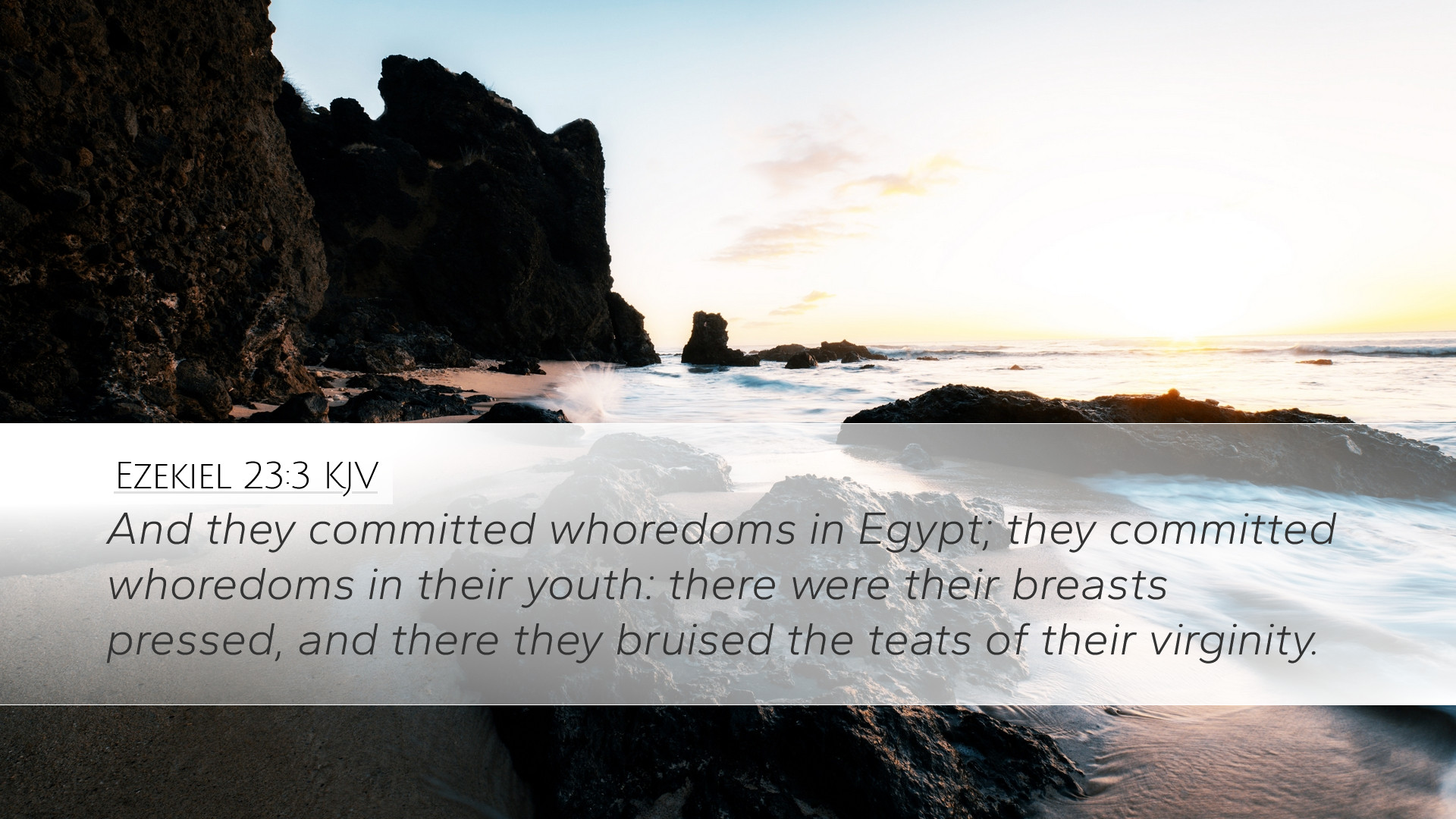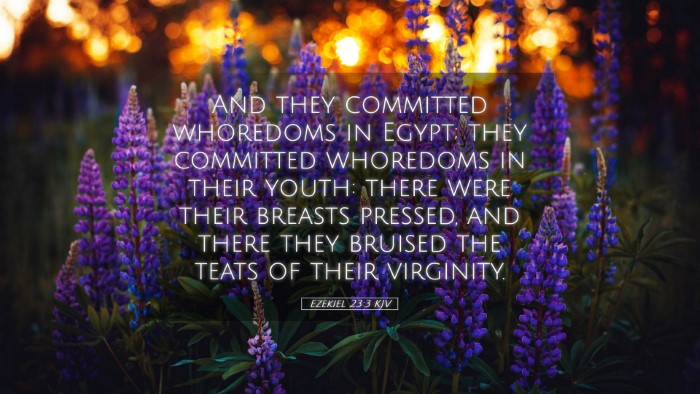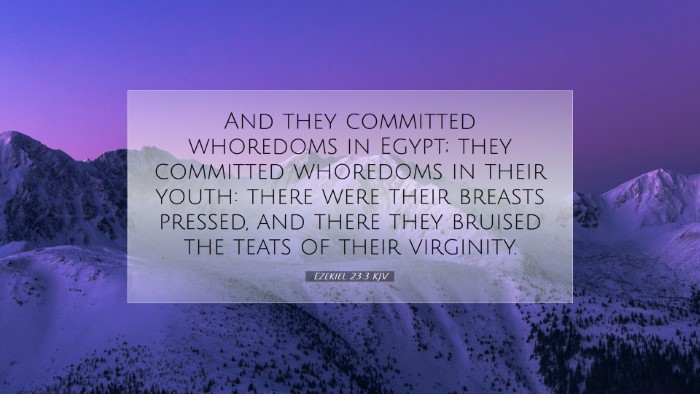Ezekiel 23:3 Commentary
Ezekiel 23:3 states, "And they committed whoredoms in Egypt; they committed whoredoms in their youth: there were their breasts pressed, and there they bruised the teats of their virginity." This verse is part of a larger allegorical narrative where God speaks through the prophet Ezekiel to illustrate the infidelity of Israel and Judah, personified as two sisters, Aholah and Aholibah. This commentary will explore various dimensions of the text, drawing upon insights from prominent public domain commentaries.
Contextual Overview
The historical context of Ezekiel's prophecy is essential for understanding this verse. The prophet writes during a time of exile in Babylon, reflecting on the spiritual unfaithfulness of both the northern kingdom (Israel) and the southern kingdom (Judah). Using the metaphor of adultery, Ezekiel highlights the breach of covenant between the Israelites and God due to the latter's idolatry and alliances with foreign nations.
Character Analysis: Aholah and Aholibah
Aholah represents Samaria (Israel), and Aholibah represents Jerusalem (Judah). The use of these two sisters signifies the shared infidelity of both kingdoms. According to Matthew Henry, these characters are "not merely historical figures, but symbolic representations of Israel and Judah's behaviors that led to their downfall."
Albert Barnes emphasizes that the actions described are not merely personal, but reflect a corporate identity. The whoredoms committed are understood as Israel's alliances and truces with surrounding nations, particularly Egypt, as well as the worship of false gods. This gross unfaithfulness is compared to sexual immorality, illustrating the depth of Israel's betrayal.
Thematic Elements
-
Idolatry as Adultery: The metaphor of whoredom vividly conveys the severity of idolatry. As Adam Clarke notes, "The language is intentional and stark; it conveys God's profound disappointment and the violation of the covenant relationship." This theme runs throughout Scripture, with God consistently portraying His relationship with Israel as akin to a marriage covenant.
-
The Consequences of Infidelity: The passage serves as a prelude to the dire consequences awaiting both kingdoms. The actions described have both immediate and eschatological implications. Matthew Henry concludes that the destiny of both sisters serves as a warning to the people, emphasizing the futility of turning away from God.
-
Egypt as a Symbol: Egypt is frequently referenced as a source of temptation and compromise. Barness notes, "Egypt was seen not only as a physical place of refuge but also a spiritual embodiment of temptation." The historical context of Israel's enslavement in Egypt contrasts sharply with their later choices, highlighting the irony of seeking safety in the hands of their former oppressors.
The Role of Youth in Spiritual Unfaithfulness
The phrase "in their youth" is particularly significant as it alludes to the vulnerability and naivety often associated with youthfulness. Adam Clarke points out, "Youth carries an inherent susceptibility to temptation, often leading to choices made in haste without spiritual discernment." This observation serves as a reminder for contemporary believers to guard their hearts and minds against the influences that can lead to spiritual compromise early in life.
Application for Today
Understanding Ezekiel 23:3 allows modern readers—pastors, students, and scholars—to reflect on the nature of their own spiritual commitments. The vivid portrayal of unfaithfulness challenges each individual to examine their heart for any instances of idolatry or compromise.
-
Self-Examination: Reflecting on one's own allegiances and attachments can reveal areas of spiritual infidelity. Are we placing our trust in modern-day 'Egypts'—materialism, politics, or even relationships—that lead us away from God's commands?
-
Teaching the Next Generation: The focus on youth within this verse emphasizes the importance of instilling biblical truths in children and young adults. Understanding and teaching about the consequences of spiritual unfaithfulness can prevent the repeating patterns seen in Aholah and Aholibah.
-
Covenant Faithfulness: Ultimately, the call of this passage is to remain faithful to God. As modern believers, there is an imperative to honor the covenant forged through Christ—a relationship that demands loyalty and love in return.
Conclusion
Ezekiel 23:3 serves as a poignant reminder of the dire consequences of spiritual infidelity. Through the metaphors of marital unfaithfulness and the symbolic representation of Aholah and Aholibah, God communicates profound truths regarding His relationship with His people. Insights from esteemed theologians such as Matthew Henry, Albert Barnes, and Adam Clarke converge to paint a comprehensive picture of the grief God experiences due to His people's unfaithfulness. For contemporary believers, this verse inspires a renewed commitment to covenant faithfulness, vigilance against spiritual compromise, and the imperative of fostering a faithful legacy for future generations.


